
The Lagos State Government has outlined measures to transform the urban transport sector into one that produces clean energy with the incorporation of the use of hydroelectricity, CNG, biomass, geothermal energy, and renewable energy sources such as wind power and solar energy.
Lagos State Governor, Babajide Sanwo-Olu, disclosed this in a keynote address at the start of the maiden edition of a two-day National Conference on Sustainable Urban Mobility in Lagos by the Lagos Metropolitan Area Transport Authority (LAMATA).
Represented by the Deputy Governor, Dr Kadri Obafemi Hamzat, Governor Sanwo-Olu disclosed that “towards sustainable urban mobility, LAMATA is currently implementing two pilot demonstration schemes on CNG buses and Electric buses. This transition will reduce emissions and create a cleaner, quieter and healthier environment for all Lagosians.
The Governor underscored the urgent need to tackle the intertwined challenges of climate change, urbanisation, and social inequality while seizing the opportunities offered by digital innovation. He emphasised that Lagos’s transition to sustainable transport will significantly reduce emissions, creating a cleaner, quieter, and healthier environment for all.
He disclosed that the Lagos State government, through LAMATA and LASWA, is leveraging technology to improve public transport operations, reduce traffic congestion and make travel more convenient for our residents. “The use of real-time data to monitor traffic patterns, deployment of contactless payment systems, and the introduction of mobile apps to provide up-to-date transit information are just a few examples of how we are embracing digitalization,” he said.
In a statement by Head Corporate Communication, LAMATA, Kolawole Ojelabi, the governor also stressed the importance of gender inclusivity and accessibility in transport systems, noting that Lagos is actively working to ensure that urban transport meets the needs of women, children, the elderly, and people with disabilities. He called on policymakers to design systems that accommodate all users.
The conference with the theme: “Implementing safe, inclusive, and climate-resilient urban transport in a digital age for sustainable development” brings together policymakers, planners, engineers, researchers, operators, and other key stakeholders from across Nigeria with representatives from the Ministries of Transport from Kano, Federal Capital Territory, Kaduna, Ogun, Rivers, Benue, Edo, and Oyo.
In her opening remarks, the Managing Director of LAMATA, Abimbola Akinajo, emphasised the importance of institutionalising the SUMConference as a platform for fostering national and sub-national collaboration, building on the success of the Africa Sustainable Urban Mobility Courses (SUMCourse) hosted by LAMATA in 2022 and 2023.
She highlighted LAMATA’s pivotal role in driving initiatives that reshape urban transport and expressed the agency’s goal for collective national growth in sustainable transport.
“As cities around the world face growing challenges from climate change and urban congestion, LAMATA is championing a shift from fossil fuels to cleaner energy sources such as hydroelectricity, compressed natural gas (CNG), biomass, geothermal, wind, and solar power.
“LAMATA is also prioritizing non-motorized transport (NMT} modes like walking and cycling to promote zero-emissions mobility and create more livable cities.
“In addition, LAMATA is advancing sustainable modes and renewable energy solutions to reduce greenhouse gas emissions,” Akinajo said. LAMATA’s ongoing projects include pilot schemes for Compressed Natural Gas (CNG) and electric buses, aimed at achieving sustainable urban transport. The deployment of 11 CNG buses in August 2021 has seen over 520,000 passengers transported over 380,000 kilometers.
Further, two electric buses (e-buses) and charging stations were introduced in May 2023, covering over 120,000 kilometers. The plan is to scale up the fleet to 50 e-buses following the successful pilot.






